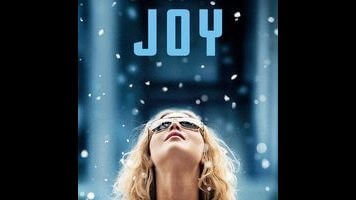Loosely inspired by the life of Joy Mangano, inventor of the self-wringing Miracle Mop, David O. Russell’s latest continues the writer-director’s post-comeback run of movies about dreamers and go-getters thwarted by doofus relations, though it can’t seem to make heads or tails of its headstrong heroine. With the exception of Three Kings, Russell’s movies have never been that focused on plot, sometimes coming across as though they were figuring themselves out as they go along, part and parcel to the filmmaker’s habit of making script changes on the fly and his longstanding preoccupation with self-actualization and therapy. But Joy lacks the crucial epiphany point, and ends up feeling incomplete—and not in the manner of, say, a work of art denying closure. Rough even by Russell’s standards, this grab bag of dropped plot points, visual metaphors, and theatrical cues looks like the underdrawing of a comic drama, only half covered in bright impasto strokes.
Here, it feels as though all of the movie’s motifs are coming to a head. Opening with a confrontation from a cheesy black-and-white soap opera (returned to throughout the movie, fashions and over-the-top plot lines updated accordingly), Joy loads itself up with stylized depictions of home and business, all meant as commentary on its heroine’s messy real life: paper houses, blueprints, a model train village, a community-theater musical, that QVC set, dream sequences set within the reality of the soap opera. (Also featured: cicadas, whose life cycle lines up with the 17 years Joy has spent putting her future on hold.) Working an airline-ticket counter to support two kids, Joy is literally the only thing keeping her household from falling apart, paying bills and fixing pipes while doing what she can for TV-addicted mom Terry (Virginia Madsen, in oversized drop-temple glasses), blue-collar dad Rudy (Robert De Niro), and Tony, the ex who’s still living in the basement when Rudy’s latest ex-wife-to-be comes to return him to the family as defective.
Joy always has a stain on her blouse, and she’s always falling asleep in weird places (couch, staircase, etc.), which, in a movie where domestic and interior life stand in for each other, means that she’s always having weird dreams. What she wants to do is manufacture, patent, and market a self-wringing mop with a removable head sewn out of a continuous loop of thread. Joy is like a portfolio of different movie pitches that all share the same premise, one of them being a dysfunctional family comedy about a clan of fuck-ups who turn against the one member who’s been keeping them solvent once she voices a dream of her own. (It’s been said that a director gives everything away in their debut feature, and then learns to shade it over time; Russell’s was about incest.) It’s also a low-stakes send-up of corporate thrillers and a half-hearted media satire and a drama about a lower-middle-class woman in some indeterminate part of the 1980s, and it’s full of zoomed-in, slowed-down, and mismatched shots and weird needle drops (including a snippet of the score to Dario Argento’s Trauma) and audible camera noise. In one extended scene, the background bends with the side effects of warp stabilizer, used to digitally erase handheld motion.
In other words, Joy is its very own decrepit household of failures and deferred promises, except that it lacks the figure that would keep it together, which would be Joy herself. Lawrence is a compelling enough actor that it doesn’t matter for a minute that she’s a decade too young for the part, but she’s still playing what feels like a preliminary sketch. Perhaps gender has something to do with it; Russell writes stubborn and independent women, but all of his completed features up to now have centered on neurotic men. (Nailed, the other Russell project with a female lead, was never completed by the director; left unfinished in 2008, it was released earlier this year as Accidental Love without his name or input.) From the opening title card to the narration by Joy’s grandmother (Diane Ladd), Joy never stops pointing out the fact that it’s a movie about a woman, and that it’s specifically about a woman who doesn’t need men to get things done, even though it’s only in her one-on-one scenes with men that the movie is able to draw anything out of Joy’s character beyond an aura of being the only grown-up in a house supposedly packed with them.
And in that scene in the QVC studio—which sometimes feels like Russell giving his take on 1960s Billy Wilder—Joy isn’t alone. There’s a man there, an executive named Neil Walker (Bradley Cooper), who only appears in a handful of scenes, but at this moment seems like he’s giving voice to everything our heroine wants—that crass urge to sell and succeed and get high off the rush of watching the numbers roll in and seeing the suckers at home get hooked by phony call-ins. Joy could be about this, just as it positions itself to be about plenty of other things. It has the expected grace notes, namely Russell’s knack for getting actors in the zone and the fact that he’s willing to move the camera harder than most of his contemporaries, even if the reasons why it moves are mostly murky. But in the end, as the abrupt epilogue (running through an entire movie’s worth of sidelined plot) jumps back to fake snow falling on a Texas sidewalk, the lasting impression is of a movie that isn’t about much aside from what it could have been. And for a film about dormant potential, that seems almost poetically apt, though ultimately unsatisfying.


 Keep scrolling for more great stories from A.V. Club.
Keep scrolling for more great stories from A.V. Club.